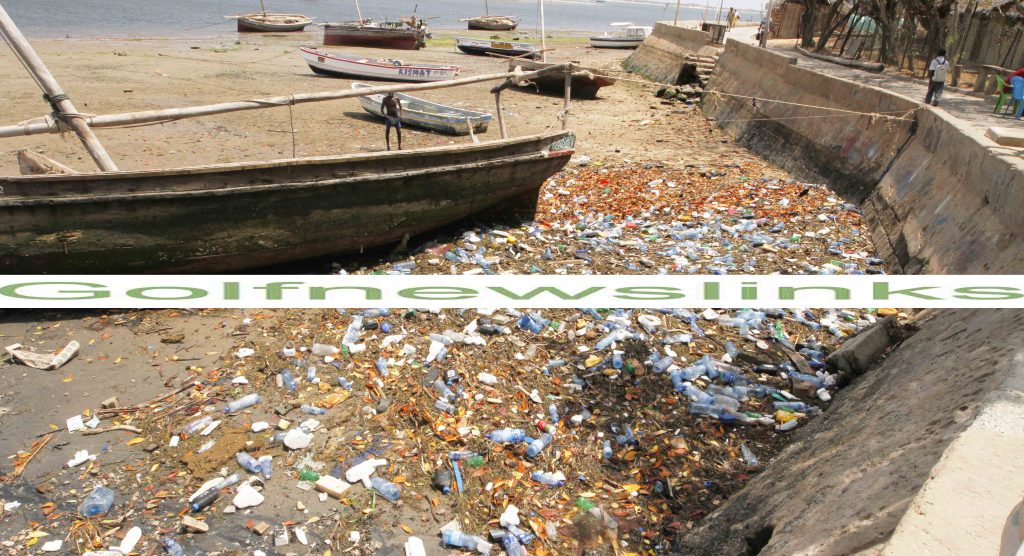– Last month of May 2023 was a monumental month for the global plastics conversation.
-And now is the time to call on African leaders to take action and turn the plastic tap off;
MAARUFU MOHAMED-GOLFNEWSLINKS;
As the world gathers at the second session of the Intergovernmental Negotiating Committee on Plastic Pollution in Paris, East African leaders are taking a stand and telling the world “we’re ready to transition into a more circular and single-use plastic free region.”

This is according to a latest press release by Dipesh Pabari from the Flipflopi in Nairobi Kenya.
“Following the recent success of the East African Regional Workshop on Single-use Plastics (SUP’S) that brought together law enforcement actors and legislators from all EAC member states the delighted to share a detailed report that captures key outcomes from the various presentations and discussions between members of parliament from 7 different countries, “said the release.
It explained that from deep-diving into all aspects of plastic pollution to site visits to big and small scale recyclers, the workshop dissected different stages of the problem and ended with all participants unanimously agreeing that harmonized legislation is crucial to tackling pollution in the region including a common approach to elimination of unnecessary single use plastics.
“Thanks to the UKaid SMEP Programme, UNCTAD, ALN and The ICCF Group for joining forces with us in making this regional workshop a great success and providing the necessary momentum and direction to taking the next steps forward, “said the statement.

It added “Gratitude to our participants and presenters, DG Mamo of NEMA, James Wakibia, David Ewusi-Mensah from Eco-Amet Solutions, Henrique Pacini UNCTAD, Davina Ngei and Rosa Nduati-Mutero from ALN as well as Mr. Green and Gjenge Makers for welcoming us to their recycling facilities.”
It said that as the World Environment Day approaches with this year’s theme being solutions to #plasticpollution, they are asking everyone that “what are you doing to tackle this crisis in your community?
It further noted that this was an important time in history and it’s upon us to mobilize our communities and be a part of the global conversation and now is the time to call on all leaders to take action and turn the plastic tap off.
The East Africa Regional workshop on Single Use Plastics (SUP) convened environmental experts, legislators, and representatives from the private and civil society sectors in Nairobi, Kenya, to deliberate on the impact of SUPs on the environment and discuss current legislation in the region.
The workshop addressed the impact of SUP on the environment, insights into substitute materials
Which can replace SUPs in some functions, the state of single use plastics trade in Africa, the state of SUP legislation in East Africa Community and the enforcement of existing laws and importance of harmonization.

Three case studies from the region were also presented based on Rwanda’s journey towards phasing out single use plastics as well as citizen approaches to tackling plastic pollution.
During the workshop, the legislators in attendance pledged action across the East African Community
Region, at national and regional level (through the East African Legislative Assembly) to combat the negative impact of single-use plastics on the environment.
The workshop concluded that the unregulated use of single-use plastics has severe consequences, including environmental pollution, health risks, and economic losses.
Harmonized regional legislation was identified as a crucial step towards addressing the issue, as it ensures consistent enforcement across borders, facilitates a circular economy, and enhances he voices of African countries in the ongoing negotiations towards a global binding instrument against plastic pollution under discussion at the UN.
The workshop emphasized the importance of collaboration among stakeholders and the need for capacity building to enhance awareness and understanding of plastic pollution issues and their Social consequences.
The workshop noted that the improper disposal of SUPs has resulted in clogged drainage systems, flooding, and loss of biodiversity and that additionally, plastic waste has found its way into the food chain, impacting human health through ingestion of micro plastics.
“Harmonized regional legislation is needed in East Africa to address the negative impacts of SUPs because environmental problems, like pollution and waste management, do not recognize national borders.
In order to effectively address these issues, it is important for countries within a region to work together and adopt a common legal framework that sets standards for the production, use, and disposal of SUPs,”said in the statement.
It further said that regardless of each East African Community (the “EAC”) member country having various laws and regulations on SUPs, cross-border pollution has become a major challenge.
The EAC, whose member states are Burundi, the Democratic Republic of Congo, Kenya, Rwanda, South Sudan, Tanzania, and Uganda, have each taken legislative action in relation to certain SUP items (mainly plastic bags) in order to reduce the detrimental effects of plastic litter.
The use of single-use plastics (SUPs) in East Africa has had devastating consequences on the environment, human health, and the economy despite the ubiquity of regulations across the region.
According to PlasticOceans.Org, 50% of all plastics produced, which now stands at 400 million tons annually, is for single use purpose only.
The high rate of SUP production and consumption, coupled with inadequate waste management Infrastructure, has led to an increase in pollution of waterways, soil, and air.
It further stated that 29M tons plastic waste into aquatic ecosystems are expected to nearly triple from around 11 million tons in 2016 to around 29 million tons in 2040.
The workshop on East Africa Regional Legislation for Single Use Plastics was designed with a multi-faceted approach.
Prior to the in-person sessions in Nairobi, Kenya, the legislators were provided with educational materials bi-weekly for two weeks to increase their awareness on the extent of plastic pollution, existing laws in the East African Community (EAC), and measures to curb plastic pollution from around the world.
This approach ensured that the attendees were well-prepared and engaged better during the In-person sessions.
The speakers at the workshop included, but were not limited to Mr. Mamo Boru Mamo, the Director General of the National Environmental Management Authority of Kenya, the UNCTAD representative Mr. Henrique Pacini, Economics Affairs Officer and Mr. James Wakibia, a Kenyan environmental activist.
In addition, Ms. Aisha Abdallah, director of ALN Academy and Hon. Rozaah Buyu Co-Chair of the Parliamentary Conservation Caucus – Kenya, gave the welcoming remarks during which she pointed
Out the importance of the role of law in successful enforcement of laws related to climate change, and Plastic pollution.
She highlighted the importance of targeted training, sharing best practices, and capacity building to better engage in parliaments across the region.

Furthermore, the presentation focused on the importance of implementing a circular economy and the need for waste management with communities.
It was highlighted that training communities and improving their livelihoods is crucial to Implementing an effective waste management system.
The ALN speaker, Ms. Rosa Nduati-Mutero highlighted the emergence of plastics as a cheap substitute for other materials with great technical performance, but which was adopted with a lack of foresight regarding the long-term environmental impact.
Since plastics do not decompose, stronger laws are needed to address the issue at source.
In analyzing existing laws, Rosa highlighted that Rwanda and Burundi have already implemented bans on single-use plastics, with exceptions for certain sectors, South Sudan struggles with enforcement due to a lack of alternatives, while Uganda is developing a national strategy for plastic pollution management7
The need for clear laws, stakeholder engagement, and political will was emphasized as crucial to ensure the success of any bans or regulations.
In addition, the presentation focused on the need for action points by legislators and corporate Governance to ensure the role of law and sustainability are linked.
The attendees shared their experiences in their respective countries, with Uganda planning a total ban on specific SUPs, and Tanzania reporting the continued use of single- use plastic bags despite a ban in 2018.
The success of a ban was attributed to clear laws, stakeholder engagement, political goodwill, and enforcement.
The session examined the lessons learned from previous failures by East African Community to pass and adopt proposed bills on controlling pollution and emphasized the need for a more
aggressive approach and careful language in the draft to increase the likelihood of success.
The draft SUP bill, drafted by ALN for the East African parliament, presented at the workshop, aims to Standardize the law and includes provisions for prohibition, recycling mechanisms, and information on packaging to curb cross-border infiltration.
Finally, policy gaps and enforcement issues related to single-use plastics policies in East Africa were discussed.
Despite Kenya’s nationwide ban on single-use plastic bags, along with a ban on SUPs
in protected areas, and emphasis on educating the public and enforcing the law, it remains a challenge to implement the ban effectively due to the difficulties of monitoring porous borders and changing consumer behavior.
The private sector was identified as having significant influence on legislation and enforcement, and the intersection of climate change and plastic pollution agendas was emphasized as an area where quick wins can be achieved.
The potential International legally binding instrument (ILBI) on plastic pollution being negotiated under the UN was discussed during this session, with emphasis on the need for a binding instrument to facilitate a series of actions to address the plastic pollution crisis.
The proposed ILBI should focus on circular economy policies and look at breaking the plastics wave.
Trade dimensions will play an important role in the agreement and its eventual implementation.
According to UNCTAD, global plastic trade is soaring with a 1.2 trillion USD trade in plastics vs the size of the material substitutes market (USD 388 billion), which suggests that more work needs to be done in promoting substitutes and alternatives.
Mr. Henrique Pacini, a UNCTAD official who is also a technical advisor to the UK-FCDO-UNCTAD Sustainable Manufacturing and Environmental Pollution Programme, highlighted the overlapping upstream, midstream and downstream measures required to facilitate circular economy policies;
such as product policy which related to design, manufacture and distribution of specific products and the waste management policies to encourage circular practices.
Notably, Mr. Pacini made the distinction between plastic substitutes and plastic
alternatives in terms of origin, properties, impact and safety, and presented SMEP’s mapping of material substitutes for single use plastics.
Hon. Rebecca Joshua Okwaci, MP, South Sudan said “together with Africa and the international Community, South Sudan would encourage higher adoption of alternative materials such as jute, sisal or agricultural residues, which can promote innovations based on the traditional knowledge which has been in our country for many generations.”
The legislators raised considerations for substitutes/alternatives, such as life cycle, overlapping areas/issues of cost, public health implications, and environmental impact.
Hon.Dr. Woda Odok, South Sudan Member of EALA pointed out the conflict of interest and realities of developing or LDCs and called for consideration of such nuances in implementing alternative measures.
Hon. François Nzekuye Kabarabuza, Member of Parliament in DRC proposed a comparative study of the cost and responsibility of plastic manufacturers out of Africa for pollution in Africa.
The consequences of non-enforcement of international obligations were also discussed, and it was hoped that the proposed plastics treaty can address this extensively.
The need to move conversations from boardrooms to the masses who actually consume was highlighted, and a workshop for educators and communicators was proposed, with UNCTAD mentioning plans underway to deliver this.
Finally, the need for monitoring and evaluation on enforcement and compliance was raised, and the importance of transferring this knowledge to citizens at the grassroots level was emphasized.
ENDS;

























